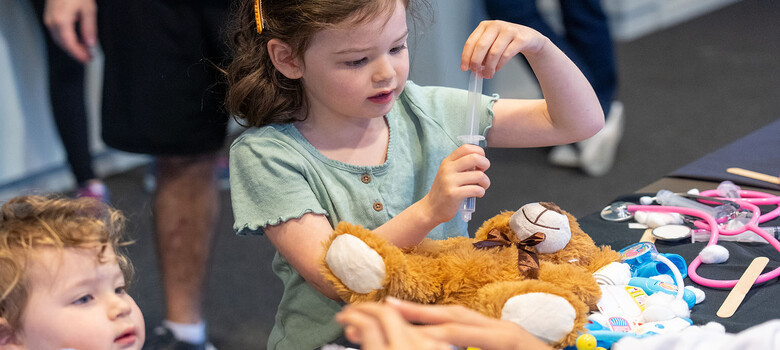RSV Protection Available for Babies and Older Adults

Immunizations and vaccines offer protection to babies and older adults from respiratory syncytial virus (RSV). The respiratory virus, which peaks from fall to early spring, can cause severe symptoms, and lead to hospitalization or even death in babies, chronically ill older children, and the elderly. Here, Duke Health pediatric infectious disease doctor Ganga Moorthy, MD, explains why immunizations are important, who should get them, and how they work.
Symptoms of RSV Are More Severe in Newborn Babies and Older Adults
RSV is the most common reason babies under 1 year of age are hospitalized each year. In young infants, RSV can cause fever and trouble breathing. For adults over age 75, RSV can lead to deadly lung infections and pneumonia -- up to 10,000 older adults die each year from complications related to RSV infection.
RSV spreads quickly from person to person. If you work outside of the home, leave your home for errands, or have other children in daycare, RSV can easily make its way back to your baby. If you care for an elderly adult or have a loved one in a nursing home, RSV can spread quickly. “These immunizations will protect infants and older adults from getting severely ill or needing to be hospitalized,” said Dr. Moorthy.
Types of Immunizations and Who Should Get Them
RSV immunizations are given once before the start of respiratory virus season, which runs from fall to early spring. Here are the three types of immunizations available, plus who should take them:
- Abrysvo is a vaccine for people who are 32 to 35 weeks pregnant and will deliver during the RSV season. Getting the vaccine while pregnant will protect your baby from RSV during their first five months of life. Abrysvo can also be given to adults 75 years or older.
- Arexvy is a vaccine for adults over 75. Adults younger than 75 may need the vaccine if they have a lung disease like asthma, a compromised immune system, or heart disease.
- Beyfortus is a monoclonal antibody immunization that offers protection from RSV to babies who are up to 8 months of age and did not receive immunity through their mothers. Babies and toddlers older than 8 months who have a chronic medical condition or weak immune system may receive a second dose of Beyfortus. Ask your pediatrician if they recommend your child have more than one dose.
The Difference Between Traditional Vaccines and Monoclonal Antibodies
The RSV vaccines, Abrysvo and Arexvy, for older adults and expectant mothers work like traditional vaccines. It takes about two weeks for them to tell your body to create new antibodies that help fight the virus.
Beyfortus, the immunization for babies, doesn’t tell the body to make antibodies. Instead, antibodies are injected directly into their bloodstream. “Babies are given the antibodies directly, which means it starts working right away,” said Dr. Moorthy. Side effects are rare, but could include injection-site reactions like a rash.
Schedule a Visit with Your Doctor for the RSV Protection
Ask your doctor about RSV protection for your child. Beyfortus, the immunization for infants, will be available at all Duke Health primary care locations starting October 1, 2024.
If you are an expectant mother, schedule a visit with your ob/gyn to receive the RSV vaccine. RSV vaccinations for pregnant people and adults are also available through your primary care doctor or pharmacy.




